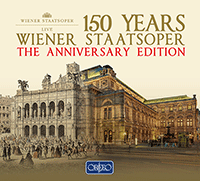Joseph Keilberth
Born into a musical family, Joseph Keilberth studied music in his native city of Karlsruhe, joined the Karlsruhe Opera as a répétiteur in 1925, and became its chief conductor in 1935. During the late 1930s he also conducted frequent opera broadcasts for Stuttgart Radio, became chief conductor of the German Philharmonic Orchestra of Prague in 1940, and during World War II also conducted at the opera houses of Hamburg and Berlin (the Staatsoper). Following the end of the war he was appointed chief conductor in 1945 of the Dresden State Opera and of its orchestra the Dresden Staatskapelle, remaining with them until 1951. He assisted with the foundation of the Bamberg Symphony Orchestra, which was based upon the membership of his old orchestra the German Philharmonic Orchestra of Prague, and was the orchestra’s chief conductor between 1950 and 1968. He toured extensively with this orchestra, throughout Europe and to North and South America, also becoming conductor of the Hamburg Philharmonic Orchestra in 1950 and first conductor at the Munich State Opera in 1951.
During the 1950s Keilberth enjoyed a busy career. Having made his debut at the Bayreuth Festival in 1952, conducting Der Ring des Nibelungen, he appeared there annually until 1956: his Festival accounts of Lohengrin in 1954 and of Der fliegende Holländer in 1955 were recorded and published by Decca. In 1952 he also appeared with great success at the Edinburgh Festival, conducting performances of Der Freischütz and Der Rosenkavalier with the Hamburg State Opera. On the concert platform he was a frequent guest conductor with the Berlin Philharmonic and Cologne Radio Symphony Orchestras, and at the Salzburg and Lucerne Festivals. Keilberth succeeded Ferenc Fricsay as chief conductor of the Munich State Opera in 1959, playing a key role in the artistic development of the newly rebuilt National Theatre, the home of this opera company. Like his predecessor at Munich, the conductor Felix Mottl, he died on the podium, while conducting a performance of Tristan und Isolde.
Keilberth was an excellent example of the German conducting tradition, in which a straightforward and dynamic presentation of the work in question was achieved with limited subjective intervention. As the ever-increasing number of his broadcast and live recordings clearly demonstrates he was a highly proficient opera conductor throughout his career, while his recordings of the symphonic repertoire have an appropriateness that is most rewarding. He first recorded commercially for the Telefunken label during World War II and remained with this label after the war, conducting a wide repertoire with the Bamberg Symphony, Berlin Philharmonic and Hamburg Philharmonic Orchestras. Of his orchestral recordings, his sterling accounts of the Symphonies Nos 3 ‘Eroica’ and 7 of Beethoven are typical, as is his fine reading of Bruckner’s Symphony No. 6, and his numerous recordings of symphonies by Mozart, such as those of No. 38 ‘Prague’ and of No. 39. Keilberth was attracted to the music of the late-Romantic German composers, and his recordings of Hans Pfitzner’s cantata Von deutscher Seele and of Reger’s Hiller and Mozart Variations are highly sympathetic, as are his accounts of scores by Hindemith, such as Nobilissima Visione and the Symphonic Metamorphosis on Themes of Carl Maria von Weber.
However it is Keilberth’s recordings of the Austro-German operatic repertoire by which he is most likely to be remembered. The Decca recordings made at Bayreuth, and especially that of Der fliegende Holländer, are theatrical and exciting, and his accounts of the Ring, of which the cycles performed in 1952, 1953 and 1955 (in stereo) have been released on disc, are similarly solid and dramatic. The re-opening of the National Theatre in Munich in 1963 was marked with a performance conducted by Keilberth of Die Meistersinger von Nürnberg, which was recorded and released commercially. Other live performances from Munich which have appeared include Richard Strauss’s Die ägyptische Helena and Der Rosenkavalier, both of which emphasise the musico-dramatic aspect of these works, and stirring accounts of Arabella and Die Frau ohne Schatten. A recording of Salome, made in Dresden and released in the early days of LP, shows the high standard of performance that Keilberth achieved during his time there. Finally an excellent studio account made with the Cologne Radio Symphony Orchestra of Mozart’s La Clemenza di Tito fully demonstrates Keilberth’s strengths as a Mozart interpreter.
© Naxos Rights International Ltd. — David Patmore (A–Z of Conductors, Naxos 8.558087–90).


































